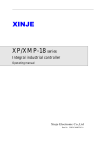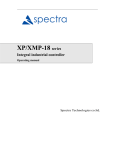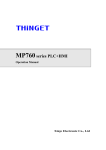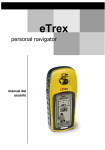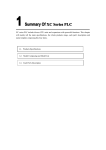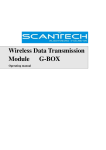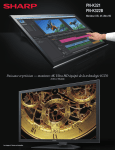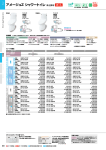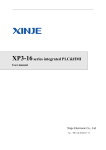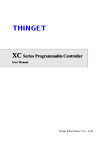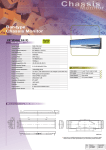Download XINJE XP/XMP series
Transcript
XINJE XP/XMP series Integral industrial controller Operating manual Xinje Electronic Co.,Ltd Data No. PHC01 20080730 3.0 XINJE Catalog Preface XP/XMP Series Safety Notes ———————————————————— 1 Summarization Operating manual ———————————————————— Input/output specification and 2 exterior layout ———————————————————— PLC Function and Application ———————————————————— HMI Function and Application Extension Ability V1.0 3 4 5 This manual includes some basic precautions which you should follow to keep you safe and protect the products. These precautions are underlined with warning triangles in the manual. About other manuals that we do not mention, please follow basic electric operating rules. Precautions Correct Application Please follow the precautions. If not, it may lead the controlsystem incorrect or abnormal, even cause fortune lose. The models could only be used according to the manual, and an only be used along with the peripheral equipments recognized or recommended by Xinje Electronic. They could only work normally in the condition of be transported, kept and installed correctly, also please operate and maintain them according to the recommendation. Xinje Electronic Co., Ltd. Copyright reserved Without exact paper file allowance, copy, translate or using the manual is not allowed. Disobey this, people should take the responsibility of loss. We reserve all the right of expansions and their design patent. Duty Declare We have checked the manual, its content fits the hardware and software of the products.As mistakes are unavoidable, we couldn’t promise all correct. However, we would check the data in the manual frequently, and in the next edition, we will correct the necessary information. Your recommendation would be highly appreciated Catalog SAFETY NOTICE.............................................................................................................................. 8 1. SUMMARIZATION....................................................................................................................... 9 1-1. Product summarization........................................................................................................ 9 1-2. Specs.................................................................................................................................. 11 1-3. Parts explanation................................................................................................................ 13 1-4. Outline dimension.............................................................................................................. 15 2. IN-OUT SPECS AND EXTERIOR LAYOUT............................................................................. 17 2-1. Input specs......................................................................................................................... 17 2-2. Relay output specs and circuit........................................................................................... 18 2-3. Transistor output specs and circuit.....................................................................................21 3. PLC FUNCTION AND APPLICATION...................................................................................... 23 3-1. PLC instruction.................................................................................................................. 23 3-2. soft component range......................................................................................................... 24 3-3. Set up a project...................................................................................................................28 3-4. communication function.................................................................................................... 31 4. HMI FUNCTION AND APPLICATION......................................................................................35 4-1. HMI function introduction................................................................................................ 35 4-2. Build a project....................................................................................................................36 5. THE EXTENSION ABILITY OF XP/XMP.............................................................................39 5-1. extend BD board................................................................................................................ 39 5-2. extend MA model.............................................................................................................. 42 5-3. Other extension.................................................................................................................. 44 5 6 Preface Thank you for purchasing Xinje XP/XMP series integral industrial controller, please read the manual before operating. Manual purpose � This manual provides user with the guide of using and operating our product, it includes the product characteristics, spec explanation, using method, etc. � This manual contains product summarization, exterior layout, PLC programme, And exterior extension. � Summarization: introduce the product characteristics, specs, dimension, installation. � Exterior layout: introduce the product power spec, in-out layout. � PLC programme: introduce how to programme in PLC. � HMI picture: introduce how to edit picture in OP. � Exterior extension: introduce extension ability of the product. Suitable people This manual aims to below users: � � � Terminal user Debugging person Technology support person Make sure you have read the safety notice before operating. AvailableIn This manual is suitable for XP/XMP series integral industrial controller. Tele-document Xinje provides user with press document and tele-document: � User CD Contained software, manual and application examples � Xinje wetsite Welcome to www.xinje.com download center to find tele-document Contact us Safety notice If you have any questions, please contact us. Tel: 86-0510-85134136 85123803 Fax: 86-0510-85111290 Addr: 4th Floor, Building 7, Originality Industrial Park, Liyuan Development Zone, Wuxi City, Jiangsu province, China 7 Read the manual carefully before operating. Be aware of the safety and correct operation. The content below focus on XP/XMP series products only. Please safekeeping the manual, put in somewhere easy to get and read and give the manual to final user. ◎ Notice items ◎ ATTENTION ● Do not put the wire close to cable, keep 10cm distance at least. ● Do not change the inside module of product or it may cause fault, error action, loss, fire. ● When it smelly or noisy, cut the power immediately ( short tweet after power on is normal ). ● Do not press the screen with pen, screwdriver or other sharp tools, it may cause screen break or error. ● For installing the product, tighten the screws to avoid loosing. ● Transport, install, store, assemble and maintain the product accurately to avoid breaking. DANGEROUSNESS ● Confirm the power voltage and wire connection before turn on the power in order to avoid breaking ● Do not touch the connection point to avoid getting an electric shock ● Do not open the back cover board ● Cut all the power before installation and take-down to avoid error and fault ● Please use in the surrounding the manual stated to avoid accident ● Do not use the product under the condition of high frequency radiation, strong magnetic field to avoid interference 1. Summarization 8 1-1. Product summarization XP/XMP series integral industrial controller integrated human machine interface(HMI) and PLC (XC1, XC2, XC3 series). It can instead of HMI and PLC to fulfill the control function. It can save space with slim outline and improve the convenience of maintenance. Product characteristics � � � � � � � � Integrate logical control, analog quantity in-out and HMI into the product On-off quantity input: 10 points, optical coupling insulation On-off quantity output: 8 points, relay output/transistor output/R&T mixture output Analog quantity: XP/XMP can extend BD board to realize analog quantity in-out control Easy edit of the HMI picture, rich function LCD display: 192×64 pixel ( 3.7 inch ), LCD useful life can reach 0.5 million hours 26 function keys can be redefined by user Sensitive and accurate key-press Multifunctional download port: HMI and PLC use one download cable Waterproof level is IP20 Small structure, space saving Simple and modern outline Type List XMP series Relay output Transistor output Relay&Transistor output XMP1-18R XMP1-18T XMP1-18RT XMP2-18R XMP2-18T XMP2-18RT XMP3-18R XMP3-18T XMP3-18RT XP series Relay output Transistor output Relay&Transistor output XP1-18R XP1-18T XP1-18RT XP2-18R XP2-18T XP2-18RT XP3-18R XP3-18T XP3-18RT Type Name 9 1 1: Name 2: PLC Type 3: In-out points 4: Output Type 2 3 4 XP, XMP series 1: XC1 series 2: XC2 series 3: XC3 series 18: Input 10 points, output 8 points R: Relay output T: Transistor output RT: Relay&Transistor output Notice: XMP series exclude XMP2-32R-E and XMP2-32T-E in this manual. About these two products, please refer to Integral Controller Manual XMP2-32R/T-E. 1-2. Specs General Specs 10 Item Power voltage Electric Surrounding Configuration Port Specs supply Specs DC12V~DC24V Power Less than 10W(TYP2.0W) Power cut moment permit Less than 20ms Endurable voltage AC1000V/10MA for 1minute ( between signal and ground ) Insulated impedance About 10MΩ ,DC500V ( between signal and ground ) Operating temperature 0~50℃ Storage temperature –10~60℃ Environment temperature 20~85% ( No dew ) Endurable quiver 10~25Hz ( X, Y, Z direction for 30 minutes ) Anti-jamming Voltage Noise: 1000Vp-p Air No causticity gas Protection According to IP20 Cooling mode Natural wind Dimension 172.0*121.0*56.5 Panel open aperture dimension 164.0*113.0 Download port RS-232 Com port RS-485 HMI Specs 11 XP series Type Kelly LCD Screen dimension 3.7 inch Useful life Over 20000 hours, 25℃, 24hours operating Display area 192*64 Contrast Regulation resistance available Character setting Register XMP series Chinese, English Character size Lattice font, vector font Touch mode Touch unable Picture 64KB FlashROM Data 4KB SRAM Matrix or resistance touch mode PLC Specs Specs Item XP1/XMP1 XP2/XMP2 XP3/XMP3 Program executing format Loop scan format, time scan format Program format Instruction, C language and ladder chart Processing speed 0.5us Power cut retaining Use FlashROM and Li battery User program’s capacity 32KB I/O points Interior coil’s points (M) Points Timer(T ) Specs Points Counter (C) Specs 128KB 128KB Input 10 points, output 8 points 449 8512 8512 80 640 640 100mS timer:Set time 0.1~3276.7 seconds 10mS timer:Set time 0.01~327.67 seconds 1mS timer:Set time 0.001~32.767 seconds 48 640 640 16 bits counter:set value K0~32767 32 bits counter:set value -2147483648~2147483647 Data Register(D) 288 words 2512 words 9024 words FlashROM Register(FD) 510 words 512 words 2048 words High speed processing function Not available High speed count、pulse output、 external interrupt 12 Setting of time scan space 0~99mS Password protection 6 bits ASCII Self diagnose function Power on self-diagnose、Monitor timer、grammar check Note: If use “ secret download ”, user program capability can be enlarged more. 1-3. Parts explanation Configuration Screen area Function key 1 2 3 4 5 6 7 8 6 7 8 9 2 3 4 5 1 0 MODE: SN: DATE: Number key XP3-18R 20060502118 20060510 无锡市信捷科技电子有限公司 13 Programme port Points connect with BD board Power supply RS-485 Com port Output points Input points In-out points arrangement 24V, 0V: power supply input A, B: RS-485 com port COM: common ground X: Input Y: Output Programme port Programme port is a RS-232 com port which has double functions of downloading PLC program and HMI pictures. The pins function of the port is as below: Pin Function Pin2 RXD Pin3 TXD Pin5 GND Xinje provides special programme cable to download the PLC program or HMI pictures. You also can make the cable by youself. Please see the pin connection between PC and the port. 14 Communication port Communication port ( A and B ) is a RS-485 com port. This port is used to connect other devices. Please refer to paragraph 3-4 for details. 1-4. Outline dimension Outline dimension Unit: mm 56.5 1 2 3 4 5 6 7 8 6 7 8 9 2 3 4 5 1 0 121 111 172 162 15 Installation dimension Unit: mm 113 164 16 2. In-out specs and exterior layout 2-1. Input specs Basic unit Input signal’s voltage DC24V±10% Input signal’s current 7mA/DC24V Input ON current Above 4.5mA Input OFF current Below 1.5mA Input response time About 10ms Input signal’s format Contact input or NPN open collector transistor Circuit insulation Photo-electricity coupling insulation Input action’s display LED light when input ON Input connection Because there is no power supply inside XP/XMP, it needs a outside supplier to drive the photoelectricity switch sensor. The supplier should be DC 24V ± 4V. The output transistor of sensor should be NPN open collector. DCsupply +5V COM R2 R1 R6 R5 X*0 LED I=7mA R4 R3 outside power supply DC24V X*7 sensor 17 � � � Input points Connect input point and com point with non-voltage point or NPN open collector transistor to turn on the input. Input loop The first loop and the second loop are insulated by optical coupler, the second loop has C-R filter which can prevent wrong action caused by industry noise or input points oscillation. As the result, there will be a response delay for 10ms to the input points. There is digital filter in the input points. Input sensitivity Input current is DC 24V 7mA. To make the input reliable, the ON current should be above 3.5mA, the OFF current should be below 1.5mA. Typical connection 2-2. Relay output specs and circuit Relay output specs Type R /RT output Relay output R:Y0~Y7 RT:Y4~Y7 Power supply Below AC250V、DC30V Circuit insulation Machinery insulation Action indication Produce close sound Maximum load Resistor load 3A T output NO 18 Inductance load 80VA LED load 100W Minimum load Response time DC5V 2mA OFF→ON 10ms ON→OFF 10ms Relay output circuit � � � � � � � Output points Relay output has two common points. So different units can drive load of different powervoltage system. Loop insulation It is electric insulated between relay output point and outside load circuit. Action indication Relay output coil produces close sound when it is on. Response time The response time is about 10ms transferring the ON or OFF singal from relay output coil to the output connection. Output current Output current is 3A per point to drive resistor load for voltage below AC250V. Inductor load is below 80VA ( AC100V or AC200V ) and light load is below 100W ( AC100V or AC200V ). Open leakage current There is no leakage current when output point is OFF, it can drive neon light. Useful life of relay output point The standard life of inductor load such as contacter, solenoid valve: according to our experiment results, 20VA load is about 3 million times, 35VA load is about 1 million times, 80VA load is 0.2 million times. However, the life will extend if parallel connect surge absorber with the load. Output connection example 19 Note: T type has no relay output, do not connect AC220V, or the product will be broken. Constitution of output circuit � � For DC inductor load, please parallel connect with commutate diode. If not connect with the commutate diode, the point’s life will be decreased greatly. Please choose the commutate diode which allow inverse voltage endurance up to 5~10 times of the load’s voltage, ordinal current exceeds load current. Parallel connect AC inductor load with surge absorber can reduce noise and extend useful life of the points. DC load AC load 20 2-3. Transistor output specs and circuit Transistor output can divide into two types: high speed pulse output and normal transistor output. High speed pulse output Type RT output T output High speed pulse output point Y0~Y1 Y0~Y7 Power supply Below DC5~30V Maximum current Maximum frequency 50mA pulse 400KHZ Normal transistor output Type RT output T output Transistor output point Y0~Y3 Y0~Y7 Power supply Circuit insulation Maximum load Below DC5~30V Optical coupling insulation Resistor load 0.8A Inductor load 12W/DC24V Light load 1.5W/DC24V Minimum load DC5V 2mA Repose time OFF→ON Below 0.2ms ON→OFF Below 0.2ms Normal transistor output circuit � � � � Output point There is one common point for basic unit transistor output Power supply The load circuit power supply should be steady voltage of DC5~30V. Circuit insulation The inside circuit of XP/XMP is insulated with output transistor by optical coupler. Action indication When driving optical coupling,LED lights,output transistor is ON. 21 � � � Response time From optical coupler driving (or cut) to transistor ON (or OFF), the time is below 0.2ms. Output current The current is 0.5A per point. But due to restriction of temperature going up, the total current is 0.8A every four points. Open current Below 0.1mA. 22 3. PLC function and application 3-1. PLC instruction The XP/XMP integrated with XC series PLC. The function of PLC is the same as XC series. XP/XMP Type Integrated PLC type XP1/XMP1 series XC1 series XP2/XMP2 series XC2 series XP3/XMP3 series XC3 series Instruction 1. XP1/XMP1 series include SFC instructions and applied instructions, exclude special function instructions. 2. XP2/XMP2 series and XP3/XMP3 series have the same instructions. They include SFC instructions, applied instructions and special function. Please refer to XC Series PLC Operating Manual: paragraph 4, 5,6. Special function instructions XP2/XMP2 and XP3/XMP3 have special function intructions, please refer to XC Series PLC Operating Manual: paragraph 6. Here we only give the port definition and distribution. 1. High speed count (1) Increment mode: 5 channels Channel Input Counter Highest frequency CHL1 X0 C600 80KHZ CHL2 X1 C602 80KHZ CHL3 X3 C604 10KHZ CHL4 X6 C606 10KHZ CHL5 X11 C608 10KHZ (2) Pulse + direction mode: 3 channels Channel Input Pulse Counter Highest frequency Direction CHL1 X0 X1 C620 80KHZ CHL2 X3 X4 C622 10KHZ CHL3 X6 X7 C624 10KHZ 23 (3) AB phase mode: 3 channel Channel Input Phase B Counter Highest frequency PhaseA CHL1 X0 X1 C630 80KHZ CHL2 X3 X4 C632 5KHZ CHL3 X6 X7 C634 5KHZ 2. High speed pulse output � T type: Y0, Y1 available, the highest frequency is 400KHz � RT type: Y0, Y1 available, the highest frequency is 400KHz � R type: unavailable 3. Interrupt function Channel Input Pointer tag Rising interruption Falling interruption Disable instruction CHL1 X2 I0000 I0001 M8050 CHL2 X5 I0100 I0101 M8051 CHL3 X10 I0200 I0201 M8052 interruption 4. Frequency measurement The point is X1, X11, X12. 5. Pulse width modulation The point is Y0, Y1. � T type: Y0, Y1 available � RT type: Y0, Y1 available � R type: unavailable 6. precise timer 32 bit precise timer, the timer range is T600 to T618, match with 10 interruption tag. 3-2. soft component range XP/XMP series soft component ID distribution list is as below: If extending BD board, the in-out point definition please refer to XP Series Extended BD Board Manual. 24 XP1/XMP1 series: Soft component Name Range Points X Input points X000~X011(octal) 10 Y Output points Y000~Y007(octal) 8 M0~ M199 【M200~M319 】 320 For special using M8000~M8079 M Auxiliary relay For special using M8120~M8139 For special using M8170~M8172 129 For special using M8238~M8242 For special using M8350~ M8370 S Status S0~S31 32 T0~T23:100ms not accumulation T100~T115:100ms accumulation T Timer T200~T223:10ms not accumulation 80 T300~T307:10ms accumulation T400~T403:1ms not accumulation T500~T503:1ms accumulation C0~C23:16 bits forth counter C300~C314:32bits forth/back counter C Counter 【C600~C603】: vacant 48 【C620~C621】: vacant 【C630~C631】: vacant D0 ~D99 【D100~D149】 150 For special using D8000~D8029 D Data register For special using D8060~D8079 For special using D8120~D8179 138 For special using D8240~D8249 For special using D8306~D8313 For special using D8460~D8469 FD0~FD411 412 For special using FD8000~FD8011 FD FlashROM register For special using FD8202~FD8229 For special using FD8306~FD8315 98 For special using FD8323~FD8335 For special using FD8350~ FD 8384 25 XP2/XMP2 and XP3/XMP3 series: Range Point Soft component Name X Input point X000~X011(octal) 10 Y Output point Y000~Y007(octal) 8 M0~ M2999 【M3000~M7999 】 8000 M Auxiliary relay M8000~M8511 512 S0~ S511 【S512~M1023 】 1024 S XP2/XMP2 Status XP3/XMP3 XP2/XMP2 XP3/XMP3 T0~T99:100ms not accumulation T100~T199:100ms accumulation T200~T299:10ms not accumulation T Timer T300~T399:10ms accumulation 640 T400~T499:1ms not accumulation T500~T599:1ms accumulation T600~T618:1ms with interruption precise time T620~T639:vacant C0~C299:16 bits forth counter C300~C318:32 bits forth/back counter 【C320~C598】: 32 bits forth/back counter C Counter 【C600~C618】: one phase high speed counter 640 【 C620~C628 】: Pulse + direction high speed counter 【C630~C638】: AB phase high speed counter D FD ED Data register FlashROM register Extend data register D0~D999 【D4000~D4999】 D0~ D3999 【D4000~D7999】 2000 8000 For special using D8000~D8511 For special using D8000~D9023 512 1024 FD0~FD255 FD0~FD1535 256 1536 For special using FD8000~FD8255 For special using FD8000~FD8511 256 512 NO 【ED0~ED16383】 0 16384 NOTE: ※1. The memorizer area in 【 】 is the defaulted power failure retentive area, the power failure retentive area of soft components D, M, S, T, C can be set via FD register. For the details, please see the following table. ※ 2. FlashROM register needn’t set power failure retentive area, its data won’t lose when power is cut (No battery). 26 ※3. The serial number of input coil and output relay are octal data, other memorizers’ number are all decimal data. ※4. There is no I/O point connected with exterior device can be used as interior relay. Soft component power failure area setting: XP1/XMP1: Soft component Area Function Default value Power failure memory area D FD8202 First address of the power failure memory area of D 100 D100~D149 M FD8203 First address of the power failure memory area of M 200 M200~M319 T FD8204 First address of the power failure memory area of T 640 No set C FD8205 First address of the power failure memory area of C 320 C320~C631 S FD8206 First address of the power failure memory area of S 512 No set ED FD8207 First address of the power failure memory area of ED 0 0 Default value Power failure memory area XP2/XMP2: Soft component Area D FD8202 First address of the power failure memory area of D 4000 D4000~D4999 M FD8203 First address of the power failure memory area of M 3000 M3000~M7999 T FD8204 First address of the power failure memory area of T 640 No set C FD8205 First address of the power failure memory area of C 320 C320~C639 S FD8206 First address of the power failure memory area of S 512 S512~S1023 ED FD8207 First address of the power failure memory area of ED 0 0 Default value Power failure memory area Function XP3/XMP3: Soft component Area D FD8202 First address of the power failure memory area of D 4000 D4000~D7999 M FD8203 First address of the power fai 3000 M3000~M7999 Function 27 lure memory area of M T FD8204 First address of the power failure memory area of T 640 No set C FD8205 First address of the power failure memory area of C 320 C320~C639 S FD8206 First address of the power failure memory area of S 512 S512~S1023 ED FD8207 First address of the power failure memory area of ED 0 ED0~ED16383 NOTE: Users can set the power failure memory area by yourself, but the area can not over the soft component area. 3-3. Set up a project About the software The PLC programme editing software is the same as Xinje XC series. Software name is XCPPro. The interface of software is as below: Set up a project We take XP3-18R as a example to explain how to set up a project. 1. Modify the type Open the software, click file---change PLC model: 28 Choose “ XP3-18/XMP3-18”: XP1/XMP1series choose XP1-18/XMP1-18; XP2/XMP2 series choose XP2-18/XMP2-18; XP3/XMP3 series choose XP3-18/XMP3-18 2. Compile the programme For programme compiling and software operating please refer to XC Series Edit Tool XCP Pro User Manual. 29 Download the programme 1. Connection Before downloading the programme, please ensure the XP/XMP has connected with PC successfully. ( The cable connection please refer to paragraph 1-3 ). Click to open software serial port configuration: Choose the correct serial port, baudrate and parity or click “check” to choose these parameters automatically. When below window shows “ connect to PLC succeeded ”, it means the connecting is successful. Click OK to continue. If the connecting is not successful, the window will show “ communication error ”. Please check the serial port and the cable. 2 Download the programme After successful connection, click to download the PLC programme. If the PLC is running, it will pop up the stop running window, click OK to continue downloading. 30 After downloading, click 3 to run the PLC programme. Upload the programme If you want to check the PLC programme in XP/XMP, click PC. Then click to save the programme. to upload the programme to the 3-4. communication function XP/XMP series support Modbus and free format communication protocol. The instructions please refer to XC Series PLC Operating Manual paragraph 6-4-1 and 6-4-2. Communication port XP/XMP series product have programme port ( DB9 pins port ) and RS-485 com port ( A, B point ). Programme port can only be used to download PLC programme and HMI pictures. However, RS485 port can be used to communicate with other devices. RS-485 port can be connected with varied devices, the communication parameters ( baud rate, data bit, etc ) can be set via software. 31 MODE: SN: DATE: XP3-18R 20060502118 20060510 无锡市信捷科技电子有限公司 RS-485 com port RS-485 com port: Point A means “ + ” signal, point B means “ – ” signal. Attention: XP1/XMP1 series product can only be used as slaver station while using their RS-485 port to communicate with other devices. Communication parameter Station No. Modbus station No. : 1-254, 255(FF) is for free format communication Baud rate 300bps~115.2Kbps Data bit 8 or 7 bits Stop bit 2 or 1 bits Check Even, odd, no check The defaulted parameters of the port: Station number is 1, baud rate is 19200bps, 8 data bit, 1 stop bit, even check Parameter setting User can set com port parameters. Please see below list for details. Attention: After changing the parameters in Flash register, it is need to reboot the XP/XMP to make the setting become effective. 32 AB com port Number Function Description FD8220 Communication mode ( station number ) 255 is free format, 1~254 is modbus station number FD8221 Communication format Baud rate, data bit, stop bit, check FD8222 ASC timeout judgment time Unit: ms, 0 means no timeout waiting FD8223 Reply timeout judgment time Unit: ms, 0 means no timeout waiting FD8224 Start symbol High 8 bits invalid FD8225 End symbol High 8 bits invalid Free format setting 8/16 bits cushion, with/without start bit, with/without stop bit FD8226 The way of setting communication parameters: FD8221: 15 14 13 12 11 10 9 8 7 6 5 4 3 2 1 0 0:300bps 1:600bps 2:1200 bps 3:2400 bps 4:4800 bps 5:9600 bps 6:19.2K bps 7:38.4K bps 8:57.6K bps 9:115.2K bps 0:No check 1:Odd check 2:Even check 0:2 stop bits 2:1stop bit 0:8bits data 1:7bits data FD8226: 15 14 13 12 11 10 9 8 Reserved 7 6 5 4 3 2 1 0 0:8 bits communication 1:16 bits communication 0: without start symbol 1: with start symbol 1:有起始符 0:without end symbol 1:with end symbol 33 Modbus communication XP/XMP series product support master and slave mode of Modbus communication protocol. Master format: When PLC is set to be master station, PLC sends request to other slave station devices via Modbus instructions, other devices respond to the master station. Slave format: When PLC is set to be slave station, it can only respond to other master devices. The defaulted status of XP/XMP is Modbus slave mode. Communication address The internal soft unit’s numbers of XP/XMP are corresponded with Modbus station address numbers, please see the following table: Coil space: ( Modbus address prefix is “ 0x ” ) Bit component Modbus address Modbus address address ( decimal K ) ( hex H ) M0~M7999 0~7999 0~1F3F X0~X511 16384~16895 4000~41FF Y0~Y511 18432~18943 4800~49FF S0~S1023 20480~21503 5000~53FF M8000~M8511 24576~25087 6000~61FF T0~T618 25600~26218 6400~666A C0~C634 27648~28282 6C00~6E7A Register space: ( Modbus address prefix is “ 4x ” ) Word component Modbus address Modbus address address ( decimal K ) ( hex H ) D0~D7999 0~7999 0~1F3F TD0~TD618 12288~12906 3000~326A CD0~CD634 14336~14970 3800~3A7A D8000~D8511 16384~16895 4000~41FF FD0~FD5000 18432~23432 4800~5B88 FD8000~FD8511 26624~27135 6800~69FF Free format communication Free format communication transfer data in the format of data block, each block can transfer 128 bytes at most. Meanwhile each block can set a start symbol and a end symbol, or not set. When communicating in free format mode, FD8220 should be 255. Start Symbol (1 byte) Data Block (max bytes 128 ) End Symbol (1 byte) 字节) 34 4. HMI function and application 4-1. HMI function introduction The HMI part of XP/XMP used OP330/MP330 series display. The faceplate key-press function is as below: Key-press Function Whatever the mode of the display is in, it will return to original system screen once you press the key ( the defaulted screen is No.1 ). Generally, set the original system screen to be main menu or most used screen. Turn the screen to the last page Turn the screen to the next page Press the key to modify the register value. The register which is being modified will display in reverse colour and the bit will twinkle. If there is no register component in the screen it will do vacancy operation once. Before pressing [ENT] key, press [SET] key again to cancel the setting and continue modifying the next data register. To write the modified value in the register and continue modifying next register. After the last register in the screen has been modified, it will quit the setting. Alarming list key. After setting the function of alarming list, press this key to jump to the alarming list screen. Clear the selected area when modifying the register data. Set the positive or negative of the data when modifying the register data. Number key 0-9, press the key to set the number you want Function key F1-F8 NOTE: Besides the function listed in the up table, all the keys can be defined as the function of “force ON”, “force OFF”, “reverse” or “momentary ON”. Please see below picture. Open OP software, put a button in the screen. All the faceplate keypresses are displayed in the key menu, user can set the function as they need. 35 4-2. Build a project About the software XP/XMP series product integrated the function of HMI and PLC, when editing the HMI screen, use HMI software OP20. The interface of OP20 is shown as below: 36 Build a project We take XMP3-18R as an example to explain how to build a project. 1. build a new project Open the OP software, click “file”-“new project” or click “ ” to build a new project. 2. choose the display type In the “select model” window, choose the correct type of XP/XMP. For this example we select “MP330(XMP)”. This window shows all the display type supported by OP software. We can select the correct type according to the content in the bracket. XP series should select OP330 XMP series should select MP330 3. select PLC type As the XP/XMP is a integrated product of OP and XC, the OP will communicate with XC inside the product, the communication parameters are defaulted. 4. edit the screen After these three steps, we can enter screen editing mode. For the editing details, please refer to OP Series Display User Manual chapter 2. 37 Screen download 1. Select com port Before downloading the screen, select the correct com port. The port is DB9 pins serial port of PC. The computer will select the port automatically, user only need to know the port number. If user can not confirm which port to use, try each port in file. If the com port is wrong, it will prompt you with the note “can not open”: Click “file”-“comm port…” to select the correct com port: 2. download Connect the XP/XMP DB9 pins com port and PC serial port using download cable. Power on the XP/XMP, click to start downloading: If the downloading is completed, it will pop up below window: Attention: (1) Do not cut the power when downloading, or you have to download again (2) The downloading cable of downloading OP screen is the same as downloading PLC programme (3) Do not download when XCPPro and OP software are both opened 38 5. The extension ability of XP/XMP 5-1. Extend BD board XP/XMP series product ( exclude XMP2-32R/T-E ) can extend XP3 series BD board via the insertion groove at the back in order to control and measure the analog quantity. The specs and type of BD board is as below table: BD board type Type Function XP3-2AD2PT-BD 2 channels analog quantity input 2 channels PT100 temperature measurement XP3-2TC-P-BD 2 channels K thermocouple temperature measurement PID adjustment inside XP3-2PT2AD1DA-BD 2 channels PT100 temperature measurement 2 channels analog quantity input 1 channel analog quantity output BD board specs XP3-2AD2PT-BD: Item Voltage input Temperature input Analog input signal DC0~5V、0~10V(Input resistor 300k Ω) Platinum resistor Pt100(2-line format) Temperature measurement range - -100~350℃ Distinguish ratio 0.15mV(10/16383) 0.1℃ Digital output range 0~16383 -1000~3500 Integrated precision ±0.8% of the full-scale Convert time 15ms×4 channels PID output value 0~K4095 Empty loader defaulted value 0 3500 39 Input characteristic Insulation No insulation among each channel of PLC I/O point 0 point (As it is operated via data register, it is not restricted by master PLC’s standard max control points) XP3-2TC-P-BD: Items Content Analog input signal K type thermocouple Input points 2 points Temperature measurement range 0℃~970℃ Digital output range 0~9700, 16 bits binary Output points 2 points Output format NPN collector open transistor output Control precision 0.4℃ Distinguish ratio 0.1℃ Integrated precision ±0.8% ( relative max value) Convert speed 45ms×2 channels Analog using power DC24V±10%,50mA XP3-2PT2AD1DA-BD: Item Voltage input Temperature input Analog signal input DC0~5V, 0~10V(input Platinum resistor Pt100 (2 resistor 300kΩ) lines format) Digital range input D/A output - - - 10 bits binary (0-1023) Analog output - range - 0~20mA, 4~20mA Temperature measurement range - -100~350℃ - Distinguish rate 0.15mV(10/16383) 0.1℃ 1/1023 Digital output r 0~16383 -1000~3500 - 40 ange Integrated precision ±0.8% of the full-scale Convert time 15ms×4 channels PID output 0~K4095 Empty loader defaulted value 0 - 3500 In-out characteristics insulation There is no insulation among each channel of PLC I/O point 0 point (As it is operated via data register, it is not restricted by master PLC’s standard max control points) Installation position of BD board The installation position of BD board on XP/XMP is as below: MODE: SN: DATE: XP3-18R 20060502118 20060510 Installate here 无锡市信捷科技电子有限公司 The configuration method and using details please refer to BD Board Manual. 41 5-2. Extend MA model XP/XMP can extend MA model via RS-485 com port (A and B point) in order to control and measure analog quantity. The type and specs of MA model are as below: MA model type Type Function MA-8DA 8 channels analog output, voltage 0-5V or 0-10V, current 0-20mA or 4-20mA MA-7PT-P 7 channels PT100 temperature measurement control, PID adjustment inside MA-8TC-P 8 channels K type thermocouple temperature measurement control, PID adjustment inside MA model specs MA-8DA: Item Voltage Output Current Output Analog input range DC0~5V、0~10V DC0~20mA、4~20mA (External load resistor 2K Ω (External load resistor less than 500Ω) ~1MΩ) Digital output range Distinguish Ratio Integrated Precision Convert speed COM port 10 bits binary data 1/1024(10 bits) 0.8% 2ms per channel RS-485 Power supply for analog usage DC24V±10%,100mA Insulation Format DC/DC convert, optical coupling insulation Installation format Can fix with M4 screw or install on DIN46277 (width: 35mm) track Dimension 140W×73H×90D MA-7PT-P: Item Content Analog input signal Pt100 platinum resistor Temperature measurement range -100℃~350℃ Digital output range -1000~3500, 16 bits with symbol, binary Control precision ±0.5℃ Distinguish ratio 0.1℃ 42 Integrated precision ±0.8% (relative max value) Convert speed 100ms×7 channels Power supply for analog DC24V±10%,50mA Installation Format Fix with M4 screws or install on DIN46277 (width 35mm) track directly Dimension 63mm×102mm×73.3mm MA-8TC-P: Item Content Analog input signal K type thermocouple Temperature measurement range 0℃~1000℃ Digital output range 0~10000,16 bits with symbol, binary Control precision ±0.5℃ Distinguish ratio 0.1℃ Integrated precision ±0.8% (relative max value) Convert speed 100ms×8 channels Power supply for analog DC24V±10%,50mA Installation Format Fix with M3 screws or install on DIN46277 (width 35mm) track directly Dimension 63mm×102mm×73.3mm MA model connection XP/XMP can connect with MA model via RS-485 com port ( A and B point ). It can extend 8 MA models via setting DIP switch of MA model. Please see the connection figure: The details and using method please refer to MA Model Manual. 43 5-3. Other extension Besides BD board and MA model, XP/XMP series product can extend other equipements which support RS-485 com port. XP/XMP can extend 32 devices via RS-485 com port such as PLC, meter, printer, inverter, etc. The conncetion figure is as below: Attention: The connection method is Bus mode, transmission line should start from station 1 to station 2, then from station 2 to station 3…….., connect as this sequence until the last station. Star mode or ring mode connection are not permitted. 44












































